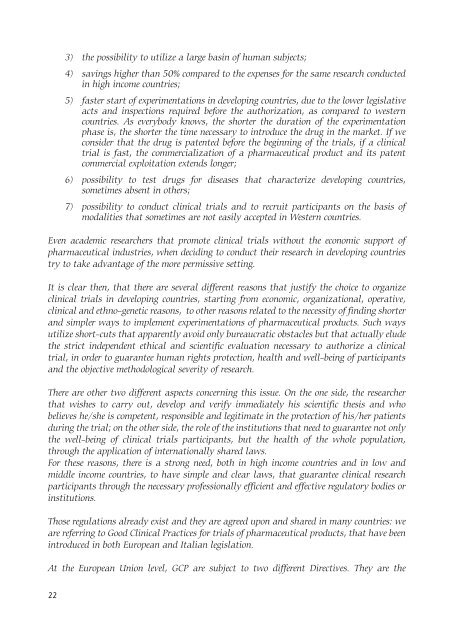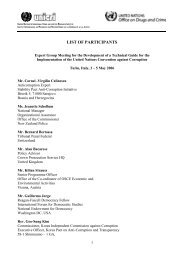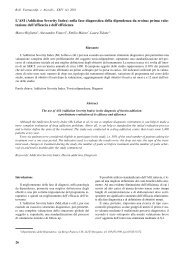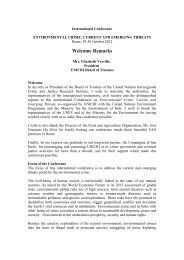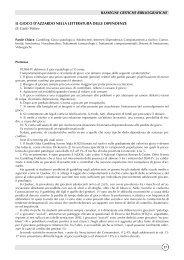Biomedical Research in Developing Countries - UNICRI
Biomedical Research in Developing Countries - UNICRI
Biomedical Research in Developing Countries - UNICRI
Create successful ePaper yourself
Turn your PDF publications into a flip-book with our unique Google optimized e-Paper software.
3) the possibility to utilize a large bas<strong>in</strong> of human subjects;<br />
4) sav<strong>in</strong>gs higher than 50% compared to the expenses for the same research conducted<br />
<strong>in</strong> high <strong>in</strong>come countries;<br />
5) faster start of experimentations <strong>in</strong> develop<strong>in</strong>g countries, due to the lower legislative<br />
acts and <strong>in</strong>spections required before the authorization, as compared to western<br />
countries. As everybody knows, the shorter the duration of the experimentation<br />
phase is, the shorter the time necessary to <strong>in</strong>troduce the drug <strong>in</strong> the market. If we<br />
consider that the drug is patented before the beg<strong>in</strong>n<strong>in</strong>g of the trials, if a cl<strong>in</strong>ical<br />
trial is fast, the commercialization of a pharmaceutical product and its patent<br />
commercial exploitation extends longer;<br />
6) possibility to test drugs for diseases that characterize develop<strong>in</strong>g countries,<br />
sometimes absent <strong>in</strong> others;<br />
7) possibility to conduct cl<strong>in</strong>ical trials and to recruit participants on the basis of<br />
modalities that sometimes are not easily accepted <strong>in</strong> Western countries.<br />
Even academic researchers that promote cl<strong>in</strong>ical trials without the economic support of<br />
pharmaceutical <strong>in</strong>dustries, when decid<strong>in</strong>g to conduct their research <strong>in</strong> develop<strong>in</strong>g countries<br />
try to take advantage of the more permissive sett<strong>in</strong>g.<br />
It is clear then, that there are several different reasons that justify the choice to organize<br />
cl<strong>in</strong>ical trials <strong>in</strong> develop<strong>in</strong>g countries, start<strong>in</strong>g from economic, organizational, operative,<br />
cl<strong>in</strong>ical and ethno-genetic reasons, to other reasons related to the necessity of f<strong>in</strong>d<strong>in</strong>g shorter<br />
and simpler ways to implement experimentations of pharmaceutical products. Such ways<br />
utilize short-cuts that apparently avoid only bureaucratic obstacles but that actually elude<br />
the strict <strong>in</strong>dependent ethical and scientific evaluation necessary to authorize a cl<strong>in</strong>ical<br />
trial, <strong>in</strong> order to guarantee human rights protection, health and well-be<strong>in</strong>g of participants<br />
and the objective methodological severity of research.<br />
There are other two different aspects concern<strong>in</strong>g this issue. On the one side, the researcher<br />
that wishes to carry out, develop and verify immediately his scientific thesis and who<br />
believes he/she is competent, responsible and legitimate <strong>in</strong> the protection of his/her patients<br />
dur<strong>in</strong>g the trial; on the other side, the role of the <strong>in</strong>stitutions that need to guarantee not only<br />
the well-be<strong>in</strong>g of cl<strong>in</strong>ical trials participants, but the health of the whole population,<br />
through the application of <strong>in</strong>ternationally shared laws.<br />
For these reasons, there is a strong need, both <strong>in</strong> high <strong>in</strong>come countries and <strong>in</strong> low and<br />
middle <strong>in</strong>come countries, to have simple and clear laws, that guarantee cl<strong>in</strong>ical research<br />
participants through the necessary professionally efficient and effective regulatory bodies or<br />
<strong>in</strong>stitutions.<br />
Those regulations already exist and they are agreed upon and shared <strong>in</strong> many countries: we<br />
are referr<strong>in</strong>g to Good Cl<strong>in</strong>ical Practices for trials of pharmaceutical products, that have been<br />
<strong>in</strong>troduced <strong>in</strong> both European and Italian legislation.<br />
At the European Union level, GCP are subject to two different Directives. They are the<br />
22


